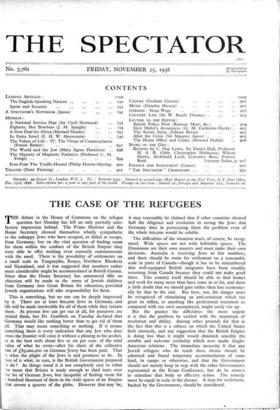THE CASE OF THE REFUGEES
THE debate in the House of Commons on the refugee question last Monday has left an only partially satis- factory impression behind. The Prime Minister and the Home Secretary showed themselves wholly sympathetic to the unhappy Jews who have escaped, or failed to escape, from Germany, but on the vital question of finding room for them within the confines of the British Empire they were able to offer nothing even remotely commensurate with the need. There is the possibility of settlements on a small scale in Tanganyika, Kenya, Northern Rhodesia and Nyasaland, and it was suggested that numbers rather more considerable might be accommodated in British Guiana. Since then the Home Secretary has announced that no objection will be made to the entry of Jewish children from Germany into Great Britain for education, provided Jewish organisations will take responsibility for them.
This is something, but no one can be deeply impressed by it. There are at least 600,000 Jews in Germany, and life will be made intolerable for all of them while they remain there. At present few can get out at all, for passports are denied them, but Dr. Goebbels on Tuesday declared that Germany would like nothing better than to get rid of them all. That may mean something or nothing. If it means something there is every indication that any Jew who does cross the frontier will cross it without a pfennig in his pocket, or at the best with about five or six per cent. of the total value of what he owns—after his share of the collective fine of £83,000,ocio on Gennan Jewry, has been paid. That is what the plight of the Jews is and promises to be. In face of it what, in sum, is the British Government prepared to do ? As things stand it is not completely easy to rebut the taunt that Britain is ready enough to shed tears over the lot of German Jews, but incapable of finding room for a hundred thousand of them in the wide spaces of an Empire that covers a quarter of the globe. However that may be, it may reasonably be claimed that if other countries showed half the diligence and resolution in saving the Jews that Germany does in persecuting them the problem even of the whole 600,000 would be soluble.
The difficulties of the situation must, of course, be recog- nised. Wide spaces are not wide habitable spaces. The Dominions are their own masters and must make their own decisions. Australia is receiving Jews in fair numbers, and there should be room for settlement on a reasonable scale in parts of Canada—though it has to be remembered that well-equipped British emigrants have been steadily returning from Canada because they could not make good there. This country itself should be able to find homes and work for many more than have come in so far, and there is little doubt that we should gain rather then lose economic- ally by that in the end. But here, too, the danger must be recognised of stimulating an anti-semitism which too great an influx, or anything like preferential treatment as compared with our own unemployed, might easily stir up.
But the greater the difficulties the more urgent it is that the problem be tackled with the maximum of resolution and ability. Among other grounds for that is the fact that this is a subject on which the United States feels intensely, and any suggestion that the British Empire is doing less than it might would diminish sensibly the notable and welcome cordiality which now marks Anglo- American relations. The immediate necessity it that any Jewish refugees who do reach these shores should be admitted and found temporary accommodation of some kind, in camps or otherwise, and that the Government should not merely keep in step with the other Governments represented at the Evian Conference, but do its utmost to stimulate that body to effective action. The remedy must be equal in scale to the disease. A loan for settlement, backed by the Governtnent, should be 'considered.














































